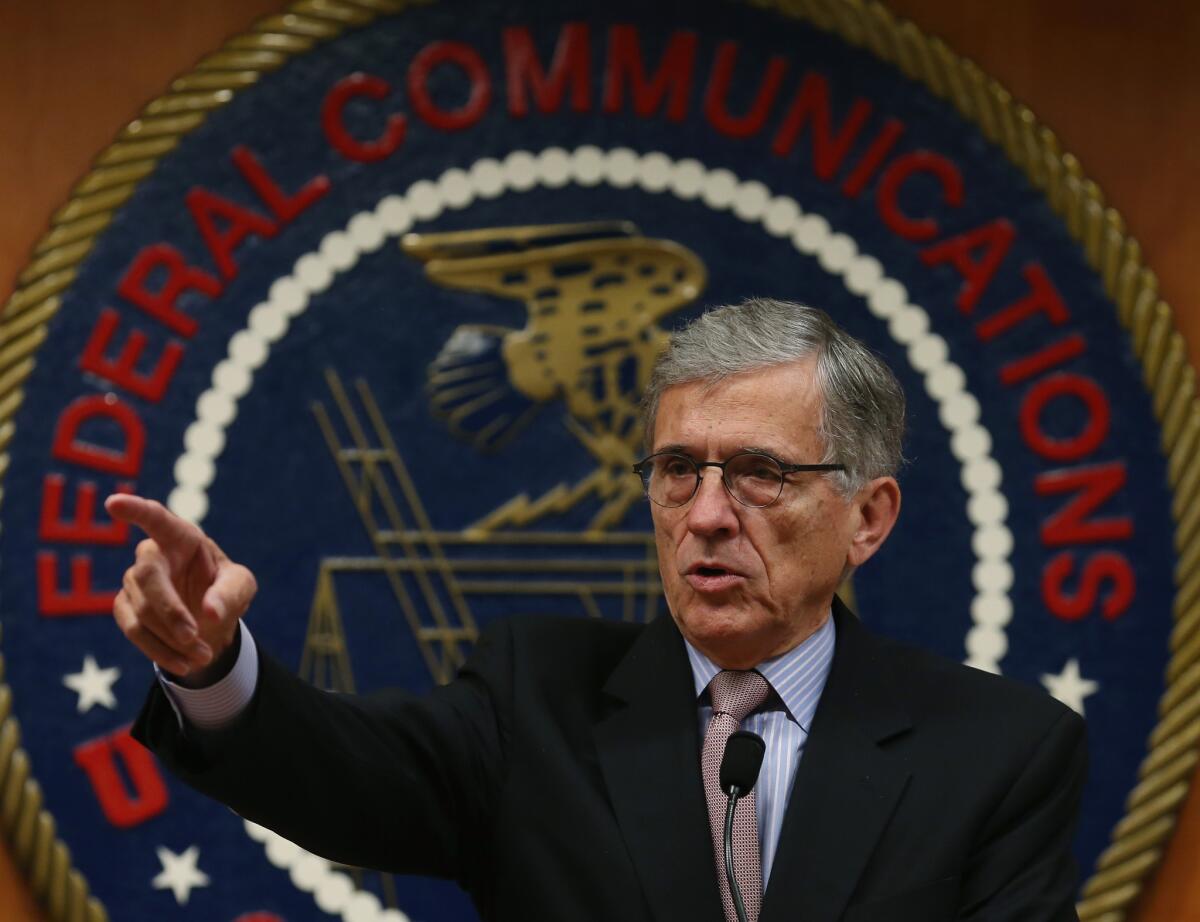CES 2015: FCC Chairman Tom Wheeler tips his hand on net neutrality

- Share via
Federal Communications Commission Chairman Tom Wheeler strongly hinted Wednesday at the Consumer Electronics Show in Las Vegas that he would propose net neutrality rules that treat broadband Internet service providers as utilities subject to more rigorous regulation than they have been to date.
If Wheeler does propose to reclassify ISPs and regulate them under Title II of the Communications Act, that would be a stinging defeat for ISPs and a victory for advocates of a stringent approach to net neutrality -- including President Obama, who appointed Wheeler. It also would almost certainly draw a challenge in court and from the Republican-controlled Congress.
Wheeler insisted that the public would have to wait until February to see the details of what he proposes. The commission is expected to vote on a new set of net neutrality rules Feb. 26.
------------
FOR THE RECORD
An earlier version of this post said that “the law specifically exempts wireless data networks from Title II.” The exemption stems from a declaratory ruling the FCC issued in 2007, not from a federal statute.
------------
Wheeler initially resisted the idea of bringing ISPs under Title II, hoping to craft net neutrality rules that continued to treat ISPs as lightly regulated “information services.” His original proposal would have allowed ISPs to strike deals with content companies and online services as long as they were “commercially reasonable.”
This approach has drawn support from ISPs, but many net neutrality advocates argue that it would allow broadband providers to divide their networks into fast and slow lanes. That would give deep-pocketed companies another advantage over start-ups, harming competition and innovation, these critics say.
Wheeler said that as the FCC studied the issue, “it became obvious that ‘commercially reasonable’ could be interpreted as what is reasonable for the ISPs, not what’s reasonable for consumers or innovators. And that’s the wrong question and the wrong answer. Because the issue here is how do we make sure that consumers and innovators have access to open networks.”
The better standard for judging ISPs’ behavior is the “just and reasonable” standard under Title II, Wheeler said.
“We’re going to propose rules that say that no blocking, no throttling, [no] paid prioritization, all that list of issues, and that there is a yardstick against which behavior should be measured. And that yardstick is ‘just and reasonable,’” Wheeler told a packed conference room at the Las Vegas Convention Center.
The main concern about using Title II is that it would deter ISPs from investing in their networks, which would also be bad for innovation and the development of data-intensive applications online.
Wheeler, though, said he had an “aha moment” over the summer when he considered how the Telecommunications Act of 1996 treated wireless phone networks. That law applied Title II rules to wireless companies, but exempted them from most of its provisions — most notably, the ones requiring regulators to approve changes in rates.
“Under that for the last 20 years, the wireless industry has been monumentally successful,” Wheeler said.
The chairman failed to mention, though, that the FCC explicitly exempted wireless data networks from Title II in 2007. And much of the wireless industry’s prodigious investment has been in its data networks, which eventually will carry mobile phone calls as well as data traffic.
Wheeler has a full plate of contentious issues, including two blockbuster mergers in the pay TV industry, new rules for local phone services and the oft-delayed “incentive auction” of broadcast TV airwaves. But the one generating the most intense heat by far is net neutrality, which Wheeler took up almost a year ago after a federal appeals court threw out the commission’s previous regulations.
At issue is how to preserve the openness and innovation that have made the Internet so important to communications and the economy. Proponents of net neutrality rules worry that ISPs have an incentive to create toll lanes on their networks, charging deep-pocketed Web companies for priority access to consumers — and giving those companies an unfair competitive advantage. Opponents (including the FCC’s two Republican appointees) say that net neutrality rules are a solution in search of a problem, and that regulating ISPs will only deter the investment needed to build a faster Internet.
Healey writes editorials for The Times. Follow his intermittent Twitter feed: @jcahealey







